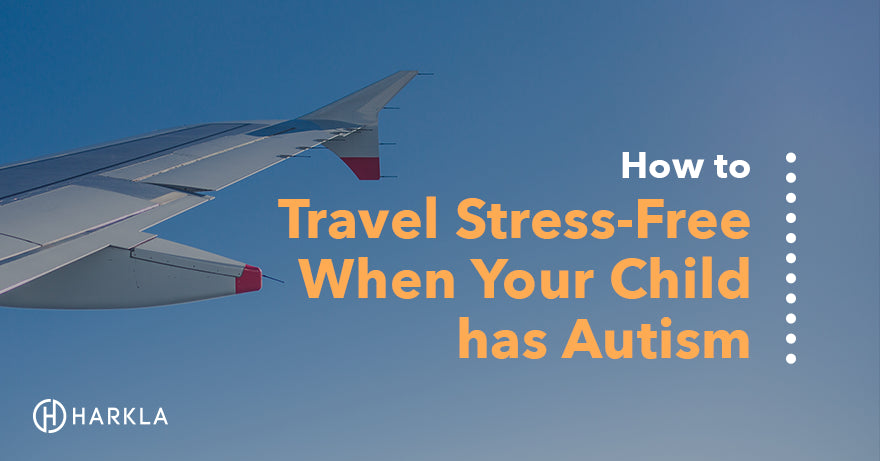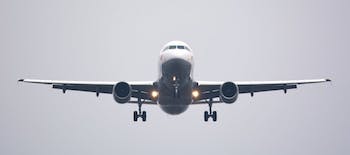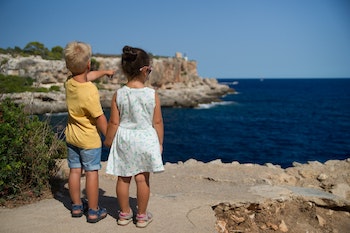Your Cart is Empty

This holiday season will find many families traveling near and far. Whether you're traveling for the holidays or for fun, whether by air or car, these trips can be exhausting and anxiety-producing.
There's a lot to consider as it is - weather, traffic, connecting flights, packing, and normal preparations. For some families, the prospect of traveling also means considering how to make the journey less stressful for your child with autism or sensory needs. In this article, we’ll share practical autistic travel tips and resources to make the trips easier, calmer, and more enjoyable for your whole family.
When traveling with an autistic child, sensory supports for a road trip are essential. Be sure to pack a portable sensory toolbox of tricks that will provide the necessary sensory inputs to help your child regulate and combat motion sickness and sensory overload.

You may not realize all that your sensory system is processing when you ride in a car, but it is a whole-body experience! The motion of the car activates your vestibular system and that input is affected by the speed of the car and the characteristics of the road (curves, hills, bumps). Even the time of day and the visual presence of oncoming car lights versus daylight distractions outside your car window plays a role in how your body processes that vestibular information.
In the contained space of a car, everything is heightened. The smells and noises coming from the car's passengers (perfume, anyone?) that would otherwise be diminished in a larger space are suddenly bombarding your olfactory and auditory systems.
If you've read our article on sensory meltdowns, you'll understand how the cumulation of all these sensory stimuli can result in a "traffic jam" in your central nervous system!
Proprioceptive sensory tools like weighted lap pads and familiar chewy or crunchy snacks will have a calming and reorganizing effect on little ones. Some of our favorite road trip essentialstarget sensory systems to combat motion sickness and sensory overload.
Keep these in mind:
For more information, check out this resource from Your Kids OT blog to see how the car travel experience might impact your sensory child and all of the different sensory systems.
Air travel is stressful for everyone, especially during the peak holiday travel weeks! I can't think of a more anxiety-producing, complex environment to navigate this season than a busy airport.

From managing luggage to navigating the long lines at check-in, and passing through TSA security checkpoints, there are a lot of transitions and crowds that would challenge any sensory system...and you haven't even gotten on the plane yet!
The same sensory issues that we talked about for car rides are present for plane trips, but now your child is surrounded by the noises and smells of 300 other people, at an altitude of 10,000 feet, in an even-more cramped space than their luxurious car seat!
When flying with an autistic child, it's important for you to plan ahead to make your child’s travel experience (and yours!) a minimally-stressful one. Luckily, there has been a recent surge in public awareness and airport service accommodations that families can take advantage of well in advance of your actual travel dates.
Wings for Autism®/Wings for All® are airport “rehearsals” specially designed for individuals with autism spectrum disorders and individuals with intellectual/developmental disabilities.
The programs are designed to alleviate the stress that families experience when flying with an autistic child or a child with intellectual/developmental disabilities. It provides the opportunity to practice entering the airport, obtaining boarding passes, going through security, and boarding a plane. Airport, airline, Transportation Security Administration professionals, and other personnel also have the opportunity to observe, interact, and deliver their services in a structured learning environment.
Be sure to check out The Arc's websitefor more information on Wings for Autism at your local airport.
A quick web search for "Wings for Autism" will provide you with related resources specific to airlines, social stories, and bloggers that have experienced the program first-hand with their child. For example, Jet Blue offers a "special assistance" page on their website that offers accommodations for a range of disabilities. For people with autism, Jet Blue's website states, "If you or a traveling companion has Autism, upon request we can provide, disability seating, pre-boarding and time to get settled before the other customers board the aircraft."
Whichever airline and airport you choose, take some time to research what accommodations are available to you.
This survival guide from Understood.org outlines 10 supports that are relevant for all travel plans. Some tips specific to air travel that will help manage your airport experiences are:
Getting ready before the trip can make traveling with an autistic child much easier. Preparation helps reduce stress, avoid surprises, and build confidence for both you and your child. Here are a few simple strategies:
Use social stories: Create or find short stories with pictures that explain what will happen on the trip. This helps your child know what to expect.
Make a visual schedule: Show each step of the trip with pictures or icons like packing, going to the airport, waiting in line, or getting in the car.
Practice packing together: Let your child choose some of their favorite comfort items and help pack the bag. This gives them a sense of control.
Try short trial outings: Before a long trip, do a few smaller practice runs - like a car ride to a nearby park or an overnight stay with family.
These small steps can help your child feel more comfortable and prepared when the real trip begins.
After all that we've written in this article thus far, it will come as no surprise that the thought of traveling for some families can be so daunting that they don't venture too far from home!

As the prevalence of autism continues to increase, the resort and hospitality communities are educating themselves and offering families additional supports to encourage positive travel experiences for children with autism.
Some businesses are claiming "autism-friendly" designations that indicate different levels of autism training for program staff in hospitality venues. Unfortunately, there is no standardized training to advise these designations so you'll need to do some research on exactly what this means based on the program you're considering.
This definition from Autism Friendly Spaces highlights that autism-friendly spaces "accommodates and supports the sensory, communication, and social/emotional needs of individuals with Autism Spectrum Disorder." The criteria AFS employs to determine if a space is autism-friendly is:
Some cruise lines, destinations, and programs are choosing to acquire a more defined "Certified Autism Center" recognition by the International Board of Credentialing and Continuing Education Standards (IBCCES).
Check out the popular and family-friendly Beaches Resorts. They recently partnered with IBCCES to become the first resort in the world to complete the required training and Autism Certification. They have specially trained employees and offer fun and engaging activities, along with custom food options. The goal is to provide a positive and memorable experience for families.
Along with this certification, businesses have access to online training modules, on-site review of their facilities, and a designation that is marketed to families as a higher level of autism awareness and service. Again, the weight and relevance of these credentials should always be considered alongside the specific needs of your child and family.
The kind of vacation your family chooses will range based on your individual preferences and needs (relaxation, adventure, theme-park; remote campsite versus resort hotel; warm temperature versus cold climate; value/budget versus luxury) but within those destination choices, you'll want to identify the characteristics that would appeal to your child while also allowing the rest of your family to enjoy themselves too!

Depending on how you've answered those questions to yourself, you might have some preliminary vacation ideas in mind.
This article from Applied Behavior Analysis Program Guide outlines some of the common vacation spots and the range of supports that they offer for families of children with and without autism. Again, if having an autism-friendly or certified center for autism is reassuring for you when making your travel plans, you can always cross-reference these resources!
Most families have to plan their vacations around school breaks or summers off. Typically those mid-year vacations are centered around prime holiday travel times, however. Keep that in mind when you're selecting a vacation location, as hotels will be busier and this may pose a challenge if your child is overwhelmed by crowded environments.
Depending on your child's level of comfort with busy environments, consider vacation locations that are off-peak. Think about visiting ski-resort towns like Vermont or Colorado in the summer, or exploring the museums of a bigger city in the winter. Resorts will be less crowded and less expensive, and any amusement park lines will be shorter if you don't mind forsaking the prime weather forecast for these conveniences.
Regardless of where you travel, how you get there, or when you choose to vacation, these trips take a significant amount of advance planning!
When you have a child with autism, your family's considerations can be compounded by sensory needs and individualized accommodations like social stories, transition aids, and pre-teaching of new routines and expectations.
If you're overwhelmed by where to start your travel planning, you might be able to find guidance with the help of a travel agent. The same credentialing agency that oversees certified autism centers offers training programs for travel agents to become certified autism travel professionals. "A Certified Autism Travel Professional™ (CATP) is defined as a professional who has demonstrated that they are both knowledgeable and capable of providing support and travel-related services to an individual on the autism spectrum as well as their family" (IBCCES). For more about this designation, check out this article here.
Packing the right items can make travel smoother and less stressful. A sensory-friendly travel kit can keep your child calm and entertained. Here’s a helpful checklist:
Noise-canceling headphones or calming music
Weighted lap pad or small sensory toy
Chewy or crunchy snacks your child enjoys
Water bottle with a straw for oral sensory input
Comfort items like a favorite blanket or stuffed animal
Extra set of comfortable, sensory-friendly clothes
Visual aids or communication cards
Travel documents and an ID card with emergency contact info
Having these items ready can give your child comfort, reduce meltdowns, and help you handle unexpected situations more easily.
Click here to check out the show notes for this podcast
There is a lot to consider if your planning to travel with an autistic child. Sensory-informed planning is the key to reducing travel stress. Be mindful of sensory supports and environments along your journey, and be proactive in meeting your child's need for routine, familiarity, and predictability when traveling to new places.
When in doubt, research autism-friendly locations with a little help from trained professionals but always keep your family's unique vacation needs and preferences in mind.
Happy travels and let us know where you end up!
Comments will be approved before showing up.


